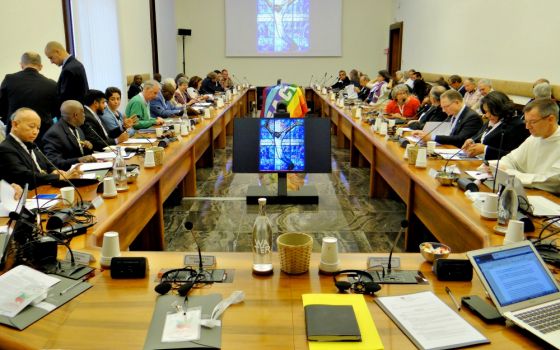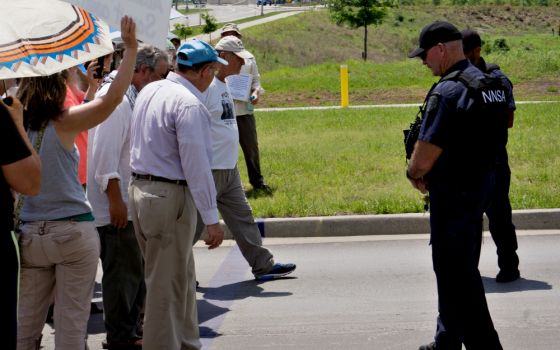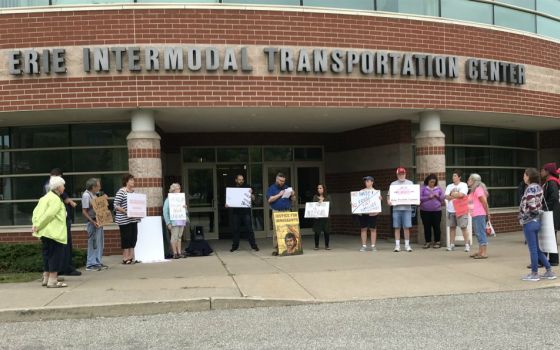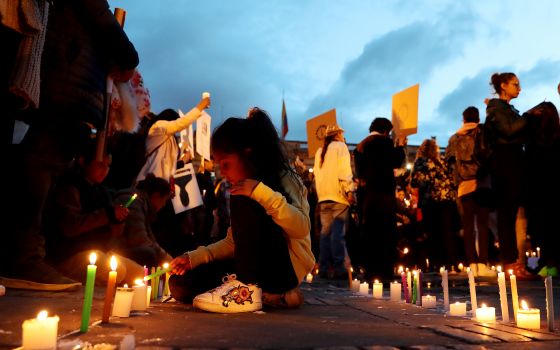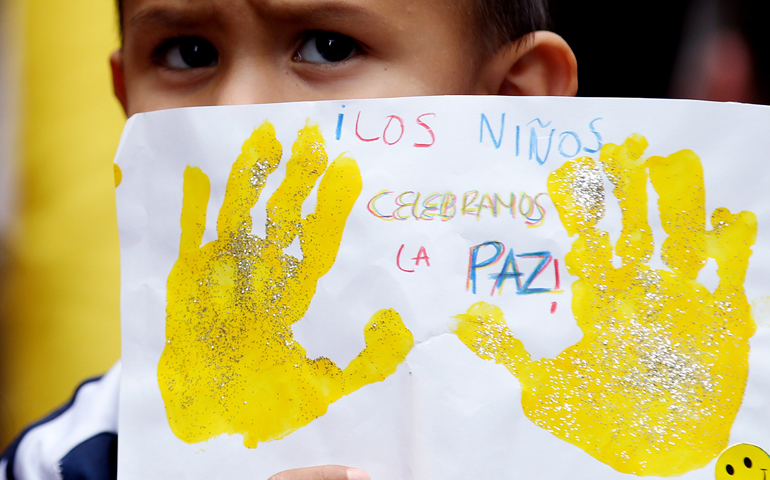
Peace.
Mention of it is everywhere one turns in the Catholic universe: It is invoked, prayed for, yearned for, counseled and envisioned as a condition of the reign of God. Our Scriptures are filled with references to it, we wish it to each other during our most sacred liturgical moment and we end that moment with an instruction to go in peace to serve.

It is a single term that, like love, is stretched to cover all human possibilities from the most intimate stirrings of the individual heart, to the world itself, to relations among nations armed with enough destructive power to obliterate that world many times over.
Like love, it is not meant to be a passive bystander, accepting what comes along or defined exclusively by moments of bliss. Jesus offered it as something other than that ordinarily known in the world and he used a term translated as "peacemaker," giving it a special place and blessing and clearly expecting his followers to do something about it.
NCR has explored peace, as an integral element of Christian life, in our reporting and commentary from our very beginnings more than 50 years ago. That interest continues today with renewed emphasis.
In recent weeks and months, we have reported on both new efforts and a new urgency in peacemaking, symbolized especially by the landmark April gathering in Rome, co-hosted by the Pontifical Council for Justice and Peace and the Catholic organization Pax Christi International. Participants from around the world urged the church to reconsider the just war theory because, they said, it was too often used to justify conflict rather than influence parties to seek peaceful solutions.
We have begun to gather a new generation of reporting on our website under the heading "Making Peace" and will, for the foreseeable future, be devoting time and resources to exploring the topics of peace and nonviolence: who's thinking about these issues, debating them in the Catholic world and beyond, who's working on them, the success stories, the failures and the ongoing threats -- new and old -- to peace in our era. We will be focusing not only on war and militarism in our culture, but also on peaceful parenting, verbal violence, mass incarceration, nonviolent approaches to global conflict, racial justice, gun violence and more.

The Catechism of the Catholic Church spends nearly five pages, in the section titled "Life in Christ," on the topic "Safeguarding Peace," and peace and justice are variously covered in other sections throughout the document. In those pages, one finds little in the way of absolutes to settle a believer's most vexing questions. The language in this area of "Life in Christ" is not very prescriptive. The prohibition is against killing, but much of the text is devoted to urging us all to do something in the area of peacemaking.
God and Caesar
What, then, is the ordinary Catholic to do? Figuring out how to be a peacemaker in everyday life is mostly, one could argue, fairly dependent on individual effort. Even there, the way is not always crystal clear. What are the considerations, for instance, of justice and mercy when dealing with personal conflicts?
Beyond that, what about the bigger picture, the big systemic issues? What burden does the individual inherit when it comes to cooperation with military ventures and national and international systems that, if one follows the thread, often violate all of the considerations of just war theory or end up doing violence to the poor as the result of a global economy that "kills," to use Pope Francis' word?
The late Scripture scholar Jesuit Fr. John McKenzie left the matter in ambiguity in one sense in his famous work The Power and the Wisdom (1965). "The Church has always existed within a state," he wrote, "and she has never arrived at a final and definitive statement of her relations with the state," instead finding ways to preserve its identity in "a bewildering variation of arrangements" encountered in states over millennia.
"To this end she has been willing to make any adjustment with any state which leaves her what she is," McKenzie wrote.
The God and Caesar conundrum is ever with us. At the same time, one can argue, the Christian community can never be absolutely neutral about the culture in which it finds itself. On that saying -- "Render to Caesar what is Caesar's and to God what is God's" -- McKenzie wrote: "We can hardly think that Jesus meant by this answer to divide the universe between God and Caesar. Caesar has nothing that is not God's. But God does not demand tribute; Caesar does, and he has the power to exact it."
Use of Caesar's money requires you pay him tribute. "Should Caesar demand something which God prohibits, or should Caesar prohibit something which God demands, you know what you must do," McKenzie wrote, leaving each age to figure out exactly what kind of demands would make the church something other than "what she is."
Dorothy Day, a founder of the Catholic Worker movement and a pacifist and war resister from the 1930s onward, said it more succinctly in her last diary in 1980: "The less you have of Caesar the less you have to render to Caesar."
Malleable principles
The broadly stated principles, growing out of the Gospels and expressed in formulations such as the just war theory, give some guidance on how to think about serious matters of war and peace, violence and nonviolence. History, however, has yet to record the instance in which heads of state, considering the theory and taking counsel from religious leaders, have decided against war.
A modern example of the malleability of those principles played out around the run-up to the multiple phases of the war in Iraq. Pope John Paul II's statements were squarely within the stream of uncompromising papal statements of the modern era condemning war and arms buildup, many of them his own.
To President George H.W. Bush, John Paul counseled against a "devastating and tragic" war prior to the first invasion of Iraq in 1991. "We cannot pretend that the use of arms, and especially of today's highly sophisticated weaponry, would not give rise, in addition to suffering and destruction, to new and perhaps worse injustices," John Paul wrote on Jan. 15, 1991.
On Jan. 13, 2003, prior to the invasion of Iraq in March of that year, he issued some of the strongest language against war ever issued by a pope. Two months before the invasion, in an address to international diplomats, he pronounced a forceful "No to war!"
"War is not always inevitable," he said. "It is always a defeat for humanity."
John Paul added, "War cannot be decided upon, even when it is a matter of ensuring the common good, except as the very last option, and in accordance with very strict conditions, without ignoring the consequences for the civilian population both during and after the military operations."
More than 13 years after no weapons of mass destruction were found anywhere in Iraq and nearly a half million deaths later (according to a 2013 study by researchers at British and U.S. universities), it is probably of small consolation to anyone in the Vatican, in Iraq or in the United States that John Paul was correct.
His words seemed to make little difference. Even an intervention by the pope's personal emissary, Cardinal Pio Laghi, who had once served as nuncio to the United States, failed to persuade a week before the start of the 2003 invasion.
Nor did any of those efforts -- the pope's unequivocal condemnation of the war or Laghi's intervention -- cause much of a stir within the U.S. Conference of Catholic Bishops or the Archdiocese for the Military Services or the estimated one quarter of all the armed forces members who identify as Catholic. The wars went on as if the pope didn't matter.

That example, admittedly, is an unusually dramatic demonstration of the disconnect between passionate papal teaching on war and what little effect it can have. Into that breach, however, land so many of the questions that keep inconveniently intruding on an otherwise settled Catholic existence, like the guest who's always on the list but who everyone hopes doesn't show up.
In a country at war
What does it mean to be a Catholic peacemaker:
- In a country in which more than half of all of its discretionary spending goes to the military? That means, for instance, that in 2015, of the $1.11 trillion in discretionary spending available for allocation by Congress, 54 percent of it, or $598.5 billion, went to the Pentagon and other defense areas, according to the National Priorities Project. Military spending has dropped over the past four or five years, largely because of withdrawal of troops from the wars in Afghanistan and Iraq, but it is on schedule to begin rising again.
- In a country that outspends the next seven countries combined, and most of those our allies? Assuming that an overwhelming majority of people would not want to live in a country without some defense structure, what amount is legitimate and rational? What is legitimate use of force and how might that be determined? What is the current thinking about such matters in the wide range of Catholic academic peace institutes and in military think tanks?
- In a country that has been at war on several fronts continuously since the start of the war in Afghanistan in 2001? Add another decade if you count the first Gulf War, which began in 1990. That was followed by a decade of cruel and nearly absolute sanctions on Iraq that a 1995 United Nations report said accounted for the deaths of more than 500,000 children under the age of 5. Most of the deaths were caused by lack of common medicines to cure waterborne and other easily treated childhood diseases.
- In a country where rampant gun violence has created the deadliest place in the developed world for non-war-related deaths and injury by firearms?
- In an era of unpredictable terrorist strikes and drone threats, of wars without borders and in which conventional rules no longer apply and the conventional power of nation-states can sometimes seem irrelevant?
- In a country where the gap continues to widen each year between those at the lowest rung of the socioeconomic ladder and those at the top? In a world where poverty continues to be the defining characteristic for too many cultures?
Pope Francis has described the global condition as "a third world war in pieces," spurred by inequity, unjust use of and squandering of resources, profiteering from the arms trade and other spoils of contemporary war and a disregard, globally, for the common good. Peace, he says, is not merely an absence of conflict, nor can we settle for "a transient peace for a contented minority."

(NCR graphic; informational source: National Priorities Project)
Peace, Francis makes clear, is not a single-track undertaking. In his encyclical Evangelii Gaudium, "The Joy of the Gospel," he quotes a document of the U.S. bishops: "Responsible citizenship is a virtue, and participation in political life is a moral obligation."
But "becoming a people," Francis says, requires more. "It is an ongoing process in which every new generation must take part: a slow and arduous effort calling for a desire for integration and a willingness to achieve this through the growth of a peaceful and multifaceted culture of encounter."
Responsible citizenship and engagement in these vital life-and-death issues begins with becoming informed. NCR reporters and editors intend to explore these and many other questions and ideas in this ongoing series. For we know that, as well as enormous questions, there exist within the Catholic community and beyond incredible efforts on behalf of peace, people living in ways that make the world more peaceful, people thinking and writing and exploring ways to make the planet a safer and more peaceful place.
Our ambition is to come at this issue from as many angles and perspectives as possible. Some of the voices you'll hear will be familiar; others will come from tucked-away corners of the community or from places and people not often included when the conversation turns to peace.
Along the way, something may spark an idea for coverage in your area or among individuals or groups that you know. Please let us know.
In our coverage, we will attempt to exploit as many storytelling and documentary techniques as possible to make full use of our online resources. So, watch these pages for regular coverage and keep checking NCRonline.org/feature-series/making-peace for more.
Related content in in the Making Peace series:
- Editorial: Let next synod be about peacemaking (Aug. 23, 2016)
- Just peace approach can elicit better strategies than war (Aug. 24, 2016)
- Congo bishops help facilitate talks between government, opposition (Sept. 1, 2016)
- Detroit parishioners gather on city's streets praying to end violence (Sept. 7, 2016)
- Jettisoning just war endangers just peace (Sept. 12, 2016)
[Tom Roberts is NCR editor at large.]

